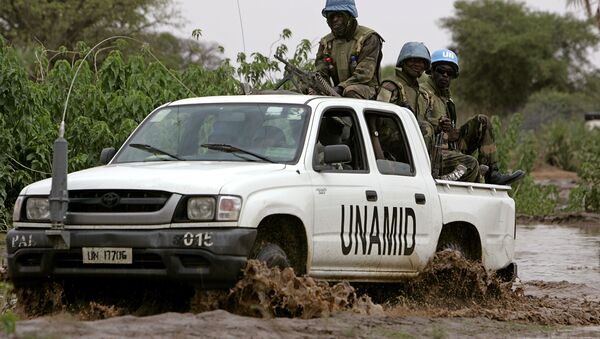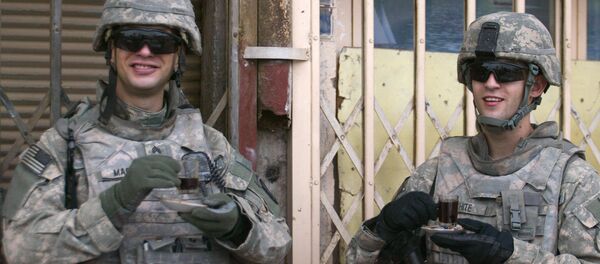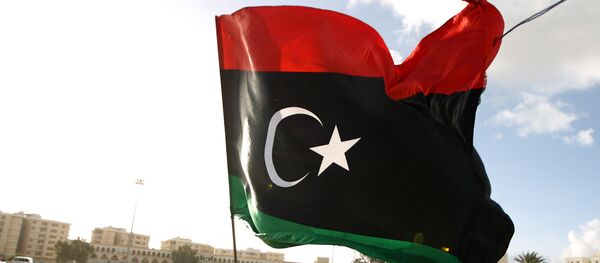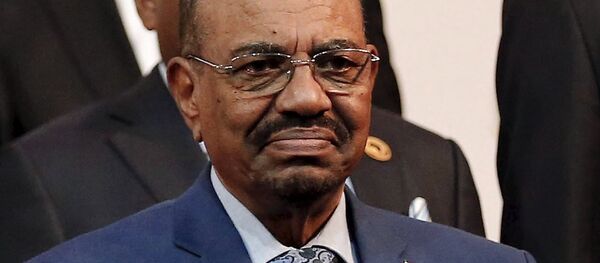Sputnik: What was the nature of your visit to Russia, and have you signed any agreements with Russian officials during your time here?
Smail Chergui: This is a regular consultation that we undertake at least once every year, but it's also in preparation of the visit of the Chairperson of the African Union Commission and the whole Commission by March 2019, for the strategic dialogue [summit] between the Russian Federation and the African Union Commission. During that big visit, we will have to sign a renewed agreement, to really take into account the added actions that we have taken in strengthening the partnership between the two sides.
Sputnik: South Africa has outlined peacekeeping operations as its priority when it becomes a non-permanent member of the UN Security Council in 2019. How will the AU coordinate with South Africa in this regard, and do you believe that the role of African countries could be increased in the UN Security Council?
Smail Chergui: Definitely, South Africa is a very important member of our organization and you know the three non-permanent of the UN Security Council are elected in the name of the continent. So it's only normal that the interaction, the coordination is very high between us and South Africa. I think rightly so.
These are new threats, these are complex new actors on the ground and as you know the UN does not have the doctrinal basis, for example, to go and combat terrorism. Meanwhile, the African Union is currently giving a better solution to all these problems, because, as we speak now, we have a very robust force that is doing a very good job in Somalia, combating al-Shabab. We recovered more than 80 percent of the territory. We are giving the political space to all the Somalis, the government, both at the federal and the regional level to have elections, to have a government, to act on a daily basis.
We did so also on LRA, so we had a joint task force which really degraded totally that terrorist group and we think that as things are expanding in the Sahel, it might be good to see also in the Africa Union own contribution on dealing with issues. We have a creative approach in the DRC where Member States initiated an African brigade within MONUSCO, which continues to do a good job in almost eliminating the M23 [rebels], and now as we speak they are also dealing with ADF. This is an experience that can also be replicated North Mali in our view.
This is to say that the level of threats, the level of challenges that we have on the ground gives pertinence to the fact that South Africa is rejoining the Security Council. It is not the first time that they have served there but I think they have always been very helpful and very instrumental in dealing with such issues.
READ MORE: Russian Companies May Dump Dollar in Trade With Africa — Business Council Chair
Sputnik: Could you tell me a little more about the plans of the African Union to replicate its experience in the Democratic Republic of the Congo, in North Mali?
Smail Chergui: We are proposing that to the UN. As you know, the mission is a UN mission as is MONUSCO, but we are proposing that maybe that is a way out because as we speak today I think MINUSMA is in a defensive posture, they don't have the initiative on the ground. Meanwhile, you have other deployments there, but terrorism is still spreading, unfortunately.
Yesterday we had a new attack on Burkina Faso. Things are going even further. So I think it's time maybe to consider or reconsider such an option, which has been proposed by countries of the region and which consists in reconfiguring MINUSMA using its current capabilities, without any surge in the force, but having a brigade within what is authorized by the Security Council, with a specific mandate to deal with issues of terrorism and transnational criminal networks.
READ MORE: African Union Encourages Russia to Participate in CAR's Future Peace Conference
Sputnik: When will the next round of negotiations led by the AU on the CAR peace process take place, and could the government be brought to the negotiating table with militant groups?
Smail Chergui: We launched what we call an African initiative and the goal is to bring 14 armed groups to a situation or an understanding where they will sign a peace agreement with the government.
So I think we have gone a long way in those efforts. We have been in contact with all of them and they all have written to us officially to say that they are supporting our initiative and also they have in those responses indicated to us what they are expecting from the government. So all those elements have been duly transmitted to the government of President Touadera. They are working on them.
By doing so I think we are putting on the table a very big contribution to the stability of the country and also to reconciliation between all the people of that country, either they are Christians, Muslims or otherwise.
We need to bring them all together. We need to make sure that all who constituted maybe a threat or pose challenges could now come back and maybe integrate with DDR and do a rather different job in securing national institutions. I think we are now in the phase of assessing all the outcomes of those efforts and then we will convene as soon as possible that conference.
Sputnik: Could you be a little more specific about the timeframe of the conference?
Smail Chergui: I think more or less we are almost ready, I think it is now to see where we are going to convene the dialogue. Is it in Bangui, in Addis Ababa or elsewhere? I think that's where we are. We want to make sure that we speak the same language with everybody.
Smail Chergui: I don't think there is a very big problem there. It's just that the demarche in our view should have the three dimensions of this approach, which means healing, reconciliation, and justice.
Sputnik: Do you believe a recognition of Russia's efforts is necessary for the draft resolution proposed by France at the UN Security Council to extend MINUSCA's mandate that will be voted on by December 15, to ensure the stability of the Central African Republic?
Smail Chergui: Russians are not pushing for a different [peace settlement] initiative. They are in full support of the African initiative, and in my discussions with Russian Foreign Minister Sergey Lavrov, this has been restated again. The Russian Federation is totally in support of the initiative of the African Union. They don't have any other initiative on the table, neither them, nor the Sudanese, nor any other.
On the table we have only the African initiative, there is no more. The Russian Federation responded to the legitimate government in providing support, and they have done it in a very transparent way through the [UN] Security Council, and I think this is a very good contribution to the stability of the country, and also giving pride to the national army of the CAR to have armaments so they can perform their duties in terms of the stability and security of the country.
So we in the African Union we don't see any difficulties in dealing with the Russian Federation on the Central African Republic, as we do with other partners. What is important is just to indicate that whoever wants to help should know that there are an elected president and legitimate government through which this action should come. Otherwise, I think this contribution, like the one provided by the Russian Federation, is a very positive one.
READ MORE: Media Head Who Sent Slain Russian Journalists to Central Africa Questioned
Sputnik: Is there a particular role that you see for Russia in convening the peace conference and in bringing the sides of the conflict in the Central African Republic together?
Smail Chergui: We have no problem to bring them together ourselves, but I know that all those who want maybe to add a word of support, a word of encouragement to the parties, to be genuine, to be forthcoming, I think that is welcome, but as the African Union we don't have any problem in bringing everybody together.
I know there were some additional efforts done, especially in Khartoum, but it's very clear that now, as I told you, the only initiative on the table is the Africa initiative and whoever wants to contribute has to do it through us.
Sputnik: How likely is it that the general elections in Libya can still take place in 2019, and how will the AU contribute to ensuring security during the elections?
Smail Chergui: I think the intention of the UN, what the UN envoy said, is to have an election around the summer, around June-July. He was proposing the national conference at the beginning of the year, maybe January.
We see the situation is still complex and as we said before, we [should] have a national reconciliation conference where all the Libyans, all the stakeholders within Libya sit around the table and address all critical issues, I think that is the only condition that will be conducive to organize elections, that the results will be accepted, and thereafter having a durable solution to the crisis.
This is an African problem, and we have a say, and we want to organize that reconciliation conference together with the UN in Addis Ababa. I am glad that here in Moscow we find strong support for that endeavour.
Sputnik: Do you already have a date set for the Libyan national reconciliation conference in Addis Ababa?
Smail Chergui: We are already at the end of the year. I think we should give ourselves more time. This situation has become so complex that the wisdom demands that we take all the necessary time.
But also we [need to] consult as widely as possible so that the initiative that we want to take will be really an added value to speed up the solution to this crisis. We hope that we can do it together [with the UN]. This is our will, our strong will that the UN could join us in organizing together that conference. I think together we are sure that
the results will really work in the direction of finding a durable solution to this crisis.
READ MORE: Russia, African States to Discuss Energy Cooperation at Energy Week — Organizer
Sputnik: Have you had any confirmation from high-level Libyan officials that they intend to attend the national reconciliation conference?
Smail Chergui: Yes, we are discussing with everybody. We had also the chairman of our heads of a state panel on this issue, President Sassou Nguesso of Congo had also met almost all the stakeholders including the chiefs of tribes, who are an important element in the political scene in Libya. He met with the government, both Mr Sarraj, he met with Aguila, he met with Haftar, so we are also meeting those people on a regular basis.
But more importantly, I was indicating to you that this approach should be fully inclusive so we have to reach out to everybody, not only those that you see maybe on a daily basis in different conferences. We need to make sure that everybody is heard.
I think everybody has suffered from such a situation and I think we should allow all the Libyans to build the country that they want for themselves and their children together, in communion, with a national consensus, this is very important. I think you may have other tribes, other armed groups. For us, we see a place in this dialogue for everybody.
Sputnik: Do you think the Palermo Conference for Libya is a positive step for bringing all the parties together at the national reconciliation conference?
Smail Chergui: We received the Prime Minister of Italy in Addis prior to that conference and he was kind enough to say, we are not pretending to solve the problem but we are just trying to push forward the solution and I think if it is an occasion for the Libyans to meet again, it is always a plus for the process.
Sputnik: When will peace talks on the roadmap agreement between Sudan's government and rebel groups in Darfur, the Blue Nile and South Kordofan take place in December?
Smail Chergui: As we speak the pre-agreement with two movements of Darfur will be signed in Germany and I just received them two weeks ago in Addis where we negotiated the finalization of this agreement and they initiated it in Addis, at the headquarters of the African Union.
So as we speak, in Berlin, Germany, these two movements will sign the pre-agreement thereafter preparing themselves to sign the cessation of hostilities and entering into discussions on what they think is important to add to the DDPD. That's the Doha agreement. In the same vein, we are pushing also forward for the finalization of the agreements in the Blue Nile, in Kordofan.
So I think what is good is that is that you have this new dynamic in Africa as a whole. After the very courageous gesture of the prime minister of Ethiopia with President Isaias together putting an end to twenty years of no war, no peace. That is also impacting the whole region and as we speak today also the relation because of the contribution of President Bashir for the signing of the renewed agreement on peace and security in South Sudan, the relation between the two countries are much better and I think that will have also its own impact on finding a solution to old conflicts.
Sputnik: When do you expect the cessation of hostilities between the sides of the conflict in Sudan?
Smail Chergui: Anytime, but anyway, on the ground let me tell you that nothing is happening now, especially [between] these two movements. I have visited myself Darfur some months ago, so we are now reducing UNAMID and those areas that will be liberated, it's proven that they are safe, they are quiet.
Sputnik: Do you expect to, therefore, withdraw this deployment that you have in the country?
Smail Chergui: Yes. I think with ongoing efforts, one could envisage the mission shut down within the framework of Silencing the Guns in Africa by 2020.
Sputnik: How does the participation in Somalian elections of Mokhtar Robow, a former deputy leader and spokesman of al-Shabab, affect the perception of the group's legitimacy and the stability of the country?
Smail Chergui: I think this is an issue that is related to democracy in that country. In Somalia our contribution to creating that space, so the federal government, the other regional governments, the parliament are really in full force. I have rather a confidence that this political system will address every issue.
Views and opinions expressed in the article are those of Smail Chergui and do not necessarily reflect those of Sputnik.










